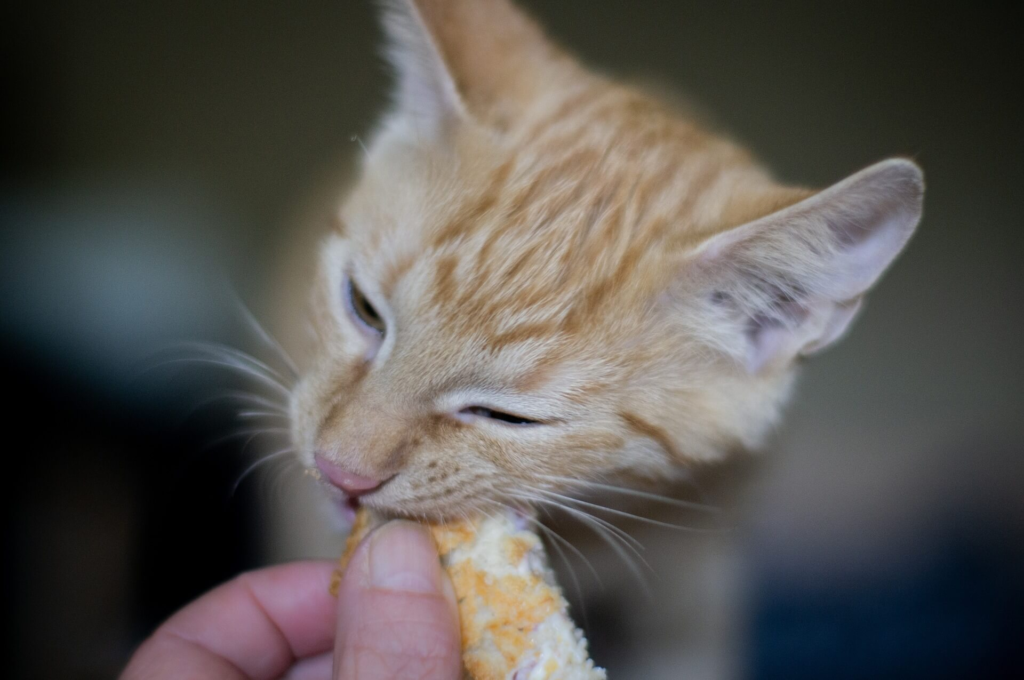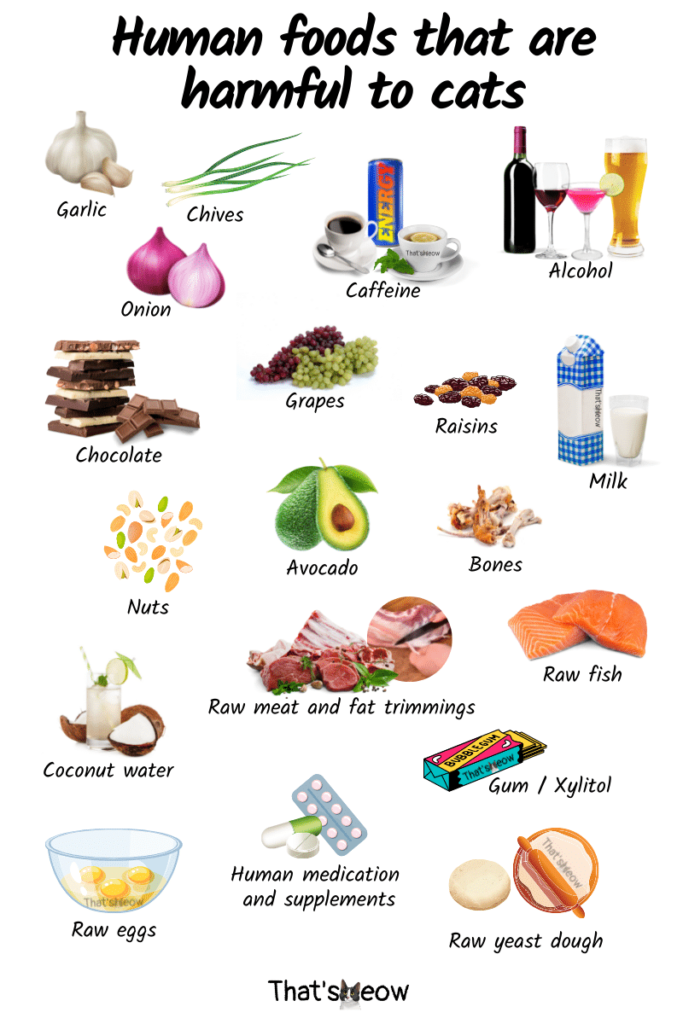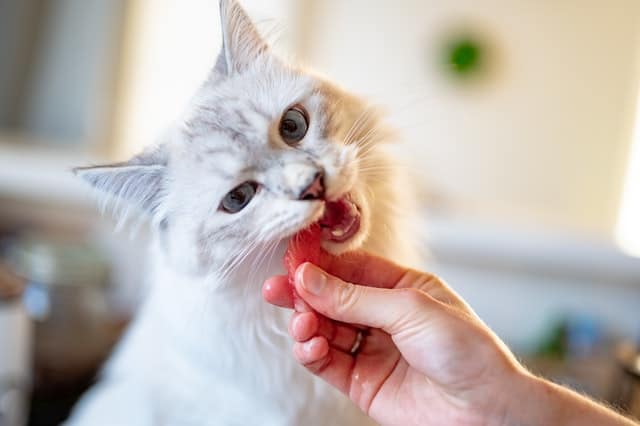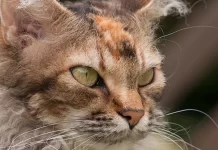Last Updated on August 30, 2023 by Fumipets
15 Human Foods Toxic to Cats
While sharing a treat with your cat might seem harmless, certain human foods can pose serious health risks to our feline friends. Being aware of these toxic foods is crucial to ensuring the well-being of your cat.
Here’s a summary of human foods that are toxic to cats, along with answers to some common questions:
Toxic Foods to Avoid:
- Chocolate: Contains theobromine, which is toxic to cats and can lead to vomiting, diarrhea, seizures, and even death.
- Onions and Garlic: These contain compounds that can damage a cat’s red blood cells, leading to anemia.
- Grapes and Raisins: Can cause kidney failure in cats, leading to lethargy, vomiting, and loss of appetite.
- Caffeine: Found in coffee, tea, and energy drinks, caffeine can lead to rapid heart rate, tremors, and seizures.
- Alcohol: Even small amounts can cause severe intoxication in cats, leading to vomiting, loss of coordination, and even coma.
It often appears normal to share everything with cats, even meals, as they are full-fledged family members. Sharing your plate, however, might be detrimental to your cat’s health depending on the meal. Be careful to know the difference between foods that are safe for cats and those that are harmful before you share that snack.
Should You Feed a Cat Human Food?
Despite your cat’s complaints, it’s crucial to understand that human-grade treats and munchies aren’t a necessary component of his diet. In order to determine what your cat should consume in order to be healthy, we collaborated with the University of Missouri Small Animal Clinical Nutrition Service in Columbia, Missouri. Outside of their normal cat food, that is, not much, it turns out.
The Clinical Nutrition Service states that “cats have specific nutrient requirements that must be met by their diet.” Giving cats a comprehensive and balanced commercial diet created by a board-certified veterinary nutritionist or someone with a PhD in animal nutrition is the easiest and most practical method to address their nutritional needs.
As a result, any vitamins and minerals offered by treats—even those from foods like fruits and vegetables that we humans would consider healthy snacks—would be in excess of what a cat consuming a varied and well-balanced diet requires. Additionally, more isn’t necessarily better when it comes to nutrition. It could even be detrimental in certain circumstances.
What Kinds of Human Foods are Safe for Cats to Eat?
However, the Clinical Nutrition Service notes that there are a number of human meals that are often thought to be acceptable for cats, provided they don’t make up more than 10% of a cat’s daily consumption. For instance, the Clinical Nutrition Service states that no more than 25 of a cat’s daily intake of 250 calories should come from any imbalanced food sources.
The Clinical Nutrition Service warns that cats must be taken into account for their unique requirements, since some cats may eat a certain food item without any problems while another cat may eat the same thing and have vomiting, diarrhea, or other negative symptoms. In light of this, it’s wise to consult your veterinarian before introducing any new human foods to your pet’s diet, even those that are normally regarded as secure.

Which Human Foods Are Toxic to Cats?
According to the Clinical Nutrition Service, there are several meals intended for humans that are harmful and shouldn’t ever be given to cats. The ASPCA has compiled a long list of cat-safe human meals, but it’s probably not all of them as many foods haven’t been subjected to peer-reviewed research to see how harmful they are.
The following foods should be avoided by cats according to the ASPCA’s list of human foods:
Alcohol: Alcoholic beverages and meals may give dogs major health issues including vomiting, diarrhea, respiratory problems, comas, and even death.
Bread dough containing yeast: Dough made with yeast has the potential to rise and create intestinal gas buildup in your cat. This has the potential to be deadly since it may cause stomach bloating and even twisting. Additionally, alcohol is a byproduct of yeast production that comes with its own set of issues (see above). However, baked bread is thought to be safe for healthy cats.
Chocolate: Theobromine and caffeine are two examples of methylxanthines, which are poisonous to pets and may result in vomiting, diarrhea, tremors, convulsions, and even death. varied forms of chocolate have varied amounts of methylxanthines. White chocolate poses the least threat, but cocoa powder does.
Coffee: Coffee, which also includes the methylxanthine caffeine found in chocolate, may have the same effects as those mentioned above.
Citrus fruits: Citrus fruits with citric acid and essential oils, such as lemons, limes, oranges, clementines, and grapefruits, might be problematic for cats. Avoiding all of the stems, leaves, peels, fruit, and seeds is advised. Large doses may result in vomiting, diarrhea, and depression of the central nervous system, whereas modest doses are likely to just result in an upset stomach.
Coconut flesh and coconut water: Small quantities of fresh coconut milk and meat are unlikely to cause major damage to pets, but larger amounts may create stomach problems. Coconut oil could be useful for certain cat skin conditions, but coconut water is too rich in potassium to be suitable for animals. Before using this as a complementary medicine or adding it to your cat’s diet, see your veterinarian.
Dairy: Dairy products may upset your cat’s stomach since many cats are lactose intolerant and can’t properly digest dairy (milk, cheese, yogurt). The best course of action is to completely avoid them, but you may inquire with your veterinarian about if a lactose-free substitute is a suitable reward.
Grapes and raisins: There is evidence that feeding grapes and raisins to cats (and dogs, too!) may result in renal failure, while the precise cause of their poisonousness to animals is yet unclear.
Nuts: Like grapes, macadamia nuts are poisonous to animals, however it is unclear exactly how. Other nut varieties, such as almonds, pecans, and walnuts, are high in oils and fats that may irritate a cat’s stomach and even result in pancreatitis.
Raw eggs: Salmonella bacteria may be present in raw eggs. Vomiting, diarrhea, and fever are indications that you are infected. Additionally, the avidin found in raw eggs prevents cats from absorbing the vitamin biotin, which is crucial for the health of their skin and hair.
Raw or undercooked meat: Similar to raw eggs, undercooked or raw meat may include germs like Salmonella and E. coli. According to the Clinical Nutrition Service, dogs eating diets based on raw meat often exhibit gastrointestinal symptoms, most frequently diarrhea.
Raw fish: Raw fish may transmit germs that lead to food illness, just as raw meat and eggs do.
Salt: Salt and salty meals may make dogs throw up, have diarrhea, tremors, have seizures, and even die in big doses.
Some vegetables and herbs: Cats can eat certain veggies, but they shouldn’t consume onions, garlic, leeks, scallions, shallots, or chives since they might upset their stomachs and potentially injure their red blood cells. Additionally, foods like garlic bread that include these herbs and vegetables should be avoided.
Xylitol: A typical sweetener found in packaged products like gum and sweets called xylitol may cause vomiting, fatigue, and liver failure in animals.

What Should You Do if Your Cat Eats Something Toxic?
Call your veterinarian or the ASPCA Animal Poison Control Center at 888-426-4435 as soon as you can if you know or think that your cat has consumed a food item on the poisonous list. You don’t have to wait until your cat exhibits symptoms of a disease before getting care. It is best to address any issues or potential issues as soon as possible.
Thankfully, according to the Clinical Nutrition Service, food-related toxicosis in cats is not common. Dogs often have more of a problem with it since they are more intrepid and undiscerning eaters.
It also pays to be selective about what you give them, much like your cat, who is probably reluctant to try new things. Consult your veterinarian before making any dietary modifications for your cat to learn which substances are secure and what dosages are suitable. You may talk about any issue, no matter how trivial.
Common Questions:
Can cats safely eat dairy products?
While small amounts of plain, unsweetened dairy might be tolerated, many cats are lactose intolerant, leading to digestive upset.
Are there safe alternatives to share with my cat?
Plain-cooked meats (without seasoning), small amounts of cooked vegetables, and cat-safe treats are better alternatives.
Can I give my catfish?
While cooked fish is generally safe, raw fish can contain parasites and lead to thiamine deficiency in cats. Moderation is key.
Is it safe for cats to eat dog food?
Cats have specific nutritional requirements that differ from dogs. Feeding them dog food regularly can lead to health issues.
Can I give my cat small amounts of chocolate?
No amount of chocolate is safe for cats. The theobromine content can be lethal, and it’s best to avoid it entirely.
Educating yourself about toxic foods is vital to keeping your cat safe and healthy. Even seemingly harmless foods can have serious consequences for feline health.
If you suspect your cat has ingested something toxic, seek immediate veterinary attention. Providing a balanced, feline-friendly diet and avoiding sharing human foods are essential steps in ensuring your cat’s well-being and longevity.


















